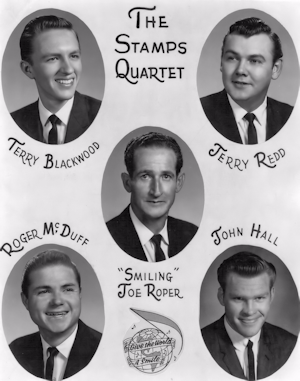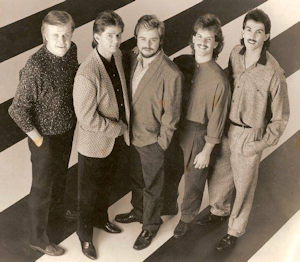 The Stamps Quartet - 1962 |
Group MembersThe Stamps Quartet (pre-JD/1962-1965) |
|
JD Sumner & The Stamps Quartet - 1990 (l-r): Ed Hill, Jerry Trammell, J D Sumner, Jack Toney, C J Almgren |
Group MembersJD Sumner And The Stamps Quartet (1965-1980, 1988-1998) |
 The Stamps Quartet - 1987/1988 (l-r): Ed Enoch, Larry Strickland, Wayne Campbell, Mike Eldred, and Guy Penrod |
History
The Stamps Quartet (After the Frank Stamps Quartet and before JD Sumner And The Stamps Quartet)
(1962-1965)
In 1962, Frank Stamps sold stock in his Stamps Quartet Music Company to James Blackwood, Cecil Blackwood and J D Sumner of the Blackwood Brothers. Stamps did not leave the company immediately, but the new investors did quickly organize a new Stamps Quartet with Jerry Redd, Roger McDuff, Terry Blackwood, "Big" John Hall and “Smiling” Joe Roper. Jim Hill, Mylon LeFevre and Chuck Ramsey later performed with this transition version of the Stamps, bridging the three years between the end of the Frank Stamps era and the beginning of the J D Sumner era.
Their 1964 LP releases What A Day That Will Be and Without Him featured similar artwork. Both title tracks became timeless classics that can now be found in most modern hymnbooks. "What A Day That Will Be" was written by tenor Jim Hill, and "Without Him" was written by baritone Mylon LeFevre.
History
JD Sumner And The Stamps Quartet
(1965-1980, 1988-1998)
In 1965, J D and James Blackwood “swapped” bass singers; Sumner went to the Stamps and John Hall went to the Blackwood Brothers. Once Sumner joined the group, they were billed as J D Sumner And The Stamps Quartet. Jimmy Blackwood went to work for J D in the Stamps at the same time. Tenor singer Jim Hill and lead singer Roger McDuff were retained from the pre-JD group. Pianist Chuck Ramsey also remained with the group during the transition, but he was replaced by J D's nephew Donnie Sumner in 1966. Donnie moved into the lead slot later that same year, and future MCA Records executive Tony Brown was brought on board to play piano. This combination was an immediate success on the concert circuit.
As the 1970s rolled around, the Stamps saw a number of changes. Most notable was their launch into global stardom as the key backup group for Elvis Presley. The Stamps would typically perform gospel music as a warm-up act for Elvis, then they would add their backing vocals once Presley took the stage. Bill Baize was soon singing tenor, and Ed Hill later came to the Stamps from the Prophets.
The group sometimes used a second bass singer during the Elvis years, with Sumner taking on more of a feature role. When they weren't traveling with Presley, they continued to appear at gospel events. Sumner sometimes stayed home and sent the rest of the Stamps out to fulfill the gospel dates. Richard Sterban and Larry Strickland were two of the bass singers that sang with the Stamps during this time. Toward the end of the 1970s, the Stamps used an alto for the top part rather than a tenor. Sandra Steele and Jennifer O’Brien are two ladies that sang with the group during those years.
In 1980, three vocalists (Larry Strickland, Buck Buckles, and Richard Lee) left the Stamps to form the country/pop group Memphis along with former Southmen lead singer Bill Crittenden. The Stamps continued for a short time with Stamps musician David Ponder moving to sing with Sumner, Ed Enoch, and Jennifer O'Brien, but Sumner and Hovie Lister soon hatched the idea for the Masters V. They initially intended for it to be a part-time group appearing at a few select events each year, but were soon working a full-time schedule. Both the Stamps and the Statesmen names were dormant while JD and Hovie, joined by Jake Hess, James Blackwood and Rosie Rozell, performed as the Masters V. Shaun Nielsen and Steve Warren filled the tenor role after Rozell left the group.
In the summer of 1987 while the Masters V group was still active, the Stamps Quartet name was briefly revived featuring Mike Eldred (tenor), Ed Enoch (lead), future Gaither Vocal Band member Guy Penrod (baritone), Larry Strickland (bass), and Wayne Campbell (piano). (Bill Crittendon was initially named as the baritone for this short-term version of the Stamps.) Meanwhile, both James Blackwood and Jake Hess had exited the Masters V, which diluted the underlying concept of that group name. J D Sumner and Hovie Lister carried on for a while with Nielsen, Jack Toney, and Ed Hill, but Sumner ultimately decided to transition back to the Stamps brand.
In 1988 at the National Quartet Convention, Steve Warren appeared singing tenor with the revived Stamps Quartet while Jack Toney and Ed Hill remained with the group during the transition. Warren was replaced by Jerry Trammell in 1989, but Warren was back by 1991. Ed Enoch had returned to the lead spot in 1990. Rick Strickland replaced Warren at tenor in 1993. When J D Sumner passed away in 1998, the final line-up consisted of Rick Strickland (tenor), Ed Enoch (lead), Ed Hill (baritone), Sumner (bass), and Jerry Kelso (piano). During the final years of the group, they toured the United States and Europe, appearing at numerous Elvis tribute events in addition to headlining on the gospel concert circuit. The Stamps also made regular appearances on the Gaither Homecoming Series where Sumner was a fixture in the bass section.
Awards
GMA Hall Of Fame (1998)
Discography
Due to the large number of recordings by J D Sumner And The Stamps Quartet, the discography has been divided into separate pages by decade. Please click on the decade you wish to view.
JD Sumner And The Stamps Quartet 1960s 1970s 1980s 1990s And Beyond
